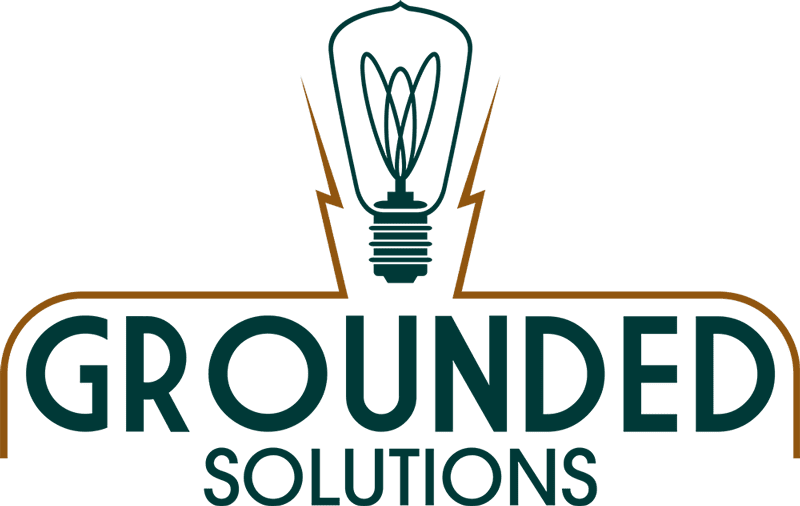Powering Your Business: The Ultimate Guide to Commercial Solar Panel Contractors
Commercial solar panel contractors are specialized professionals who design, install, and maintain solar energy systems for businesses. If you’re looking to reduce energy costs and increase sustainability for your company, here’s what you need to know about finding the right commercial solar contractor:
- Qualifications to look for: NABCEP certification, proper licensing, insurance, and extensive commercial project experience
- Services provided: Site assessment, system design, permitting, equipment procurement, installation, utility interconnection, and ongoing maintenance
- Average ROI timeline: Most commercial solar projects pay for themselves in 3.5-5.5 years with annual returns of 15-30%
- System types: Rooftop installations, ground mounts, solar carports, and community solar options
Solar power represents a smart investment for businesses looking to reduce operating costs while demonstrating environmental leadership. With the federal Investment Tax Credit covering 30% of installation costs and systems typically lasting 25-30 years, commercial solar offers long-term financial benefits beyond the initial payback period.
The right contractor will handle everything from initial energy assessment to final commissioning, ensuring your business maximizes available incentives and achieves optimal system performance. They’ll also coordinate permitting, utility interconnection, and regulatory compliance—critical steps that require specialized expertise.
I’m Clay Hamilton, President of Grounded Solutions, bringing over two decades of hands-on expertise in electrical systems and commercial solar panel contractors services to businesses throughout Indianapolis and Central Indiana. My experience with commercial solar panel contractors has shown that quality installation and proper system design are essential for maximizing both energy production and financial returns.
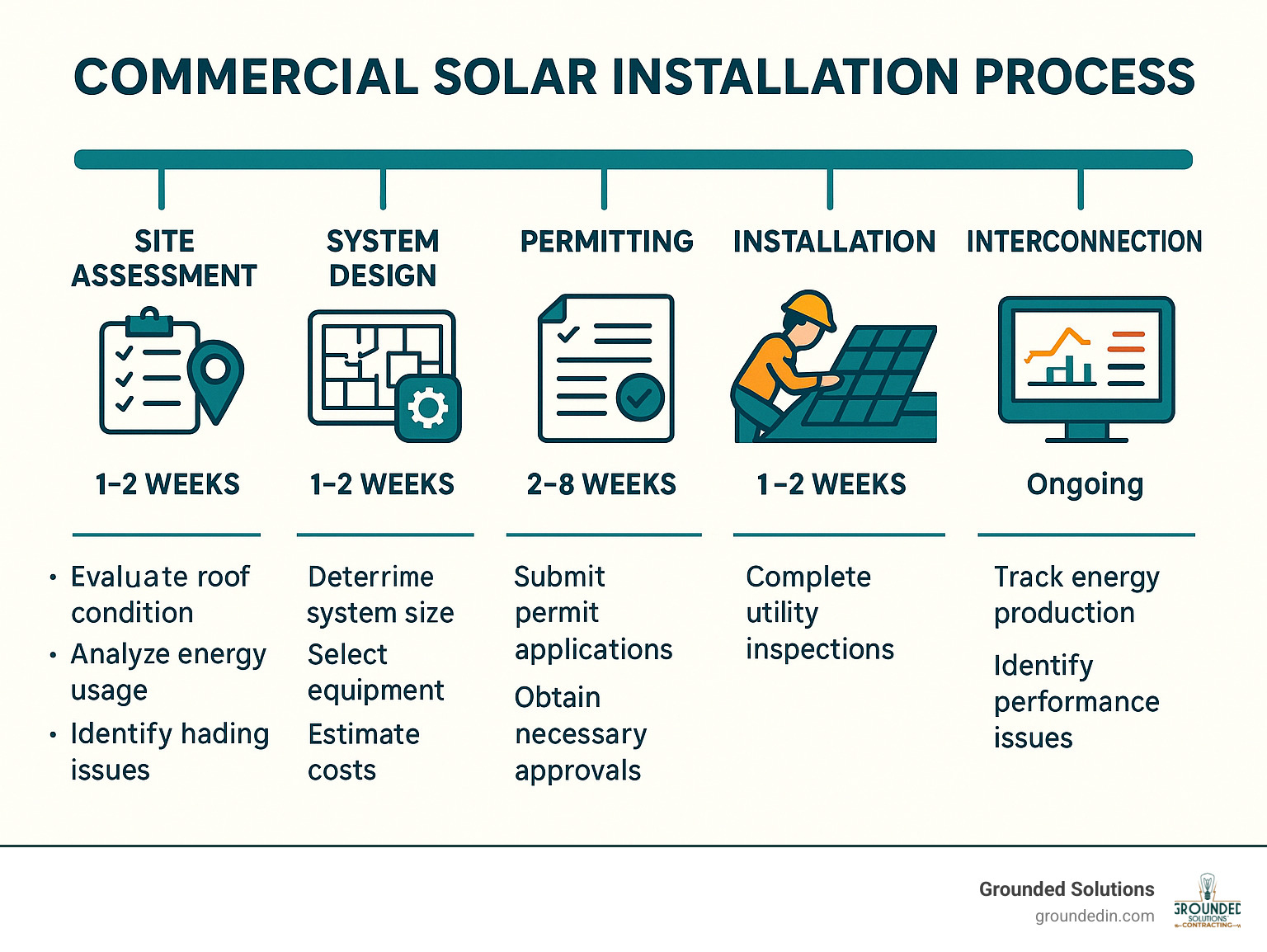
1. Start With a Comprehensive Solar Readiness Audit
If you’re considering solar for your business, the journey should always begin with a thorough solar readiness audit. I’ve seen how this crucial first step can transform a good solar installation into a great one that perfectly matches your business needs.
At Grounded Solutions, we approach each commercial solar project by first understanding your unique situation. Think of a solar audit as your business’s energy check-up – it reveals exactly what you need before making any investments.
During our comprehensive audit, we examine several critical factors that will impact your solar success:
Your roof’s condition matters tremendously. We carefully assess whether it can handle the 2-4 pounds per square foot that solar panels add, and estimate its remaining lifespan. The last thing you want is to install a 25-year solar system on a roof that needs replacement in five years!
Understanding your electrical patterns gives us the insight to design a system that matches your actual needs. By analyzing how your business consumes electricity throughout the day and across different seasons, we can size your system perfectly – not too big, not too small.
Shading is the enemy of solar production. Using specialized tools, we identify potential shadow-casting culprits like neighboring buildings, trees, or other structures that might affect your panels’ performance at different times of the day and year.
Your utility rate structure holds the key to maximizing savings. We dig into your current electricity rates, demand charges, and available incentives to build financial projections you can trust.
Why an Audit Beats Guesswork
“Would you build a house without blueprints?” That’s how our lead commercial solar technician explains the importance of proper assessment. Without good data, you’re just guessing – and guessing can be expensive.
A proper audit delivers three major benefits that guesswork simply can’t match:
Benchmark data clarifies your position. By comparing your energy usage patterns with similar Indianapolis businesses in your industry, we can spot opportunities others might miss. One local restaurant owner was surprised to learn their refrigeration systems were consuming 40% more energy than industry standards – information that shaped their solar design and overall energy strategy.
Custom financial modeling replaces generic estimates. Rather than relying on industry averages, we create financial projections based on your specific energy profile and local utility rates. This gives you reliable payback estimates you can take to the bank.
Optimized energy balance maximizes your returns. The audit helps determine the perfect balance between using solar energy on-site and sending excess power back to the grid – crucial for businesses with varying daily energy needs.
I remember working with an Indianapolis manufacturing client who finded through our audit process that by shifting certain energy-intensive processes to daylight hours, they could reduce their system size by 15% while still capturing 90% of the projected savings. This simple operational change saved them over $50,000 in upfront costs.
Ready to learn more about preparing your electrical systems for solar? Check out our detailed guide on electrical inspections to understand how these assessments protect your business.
2. Pick the Right Commercial Solar System Type for Your Property
Different properties require different solar solutions. As experienced commercial solar panel contractors, we help businesses in Indianapolis and Central Indiana select the optimal system type based on their specific circumstances.
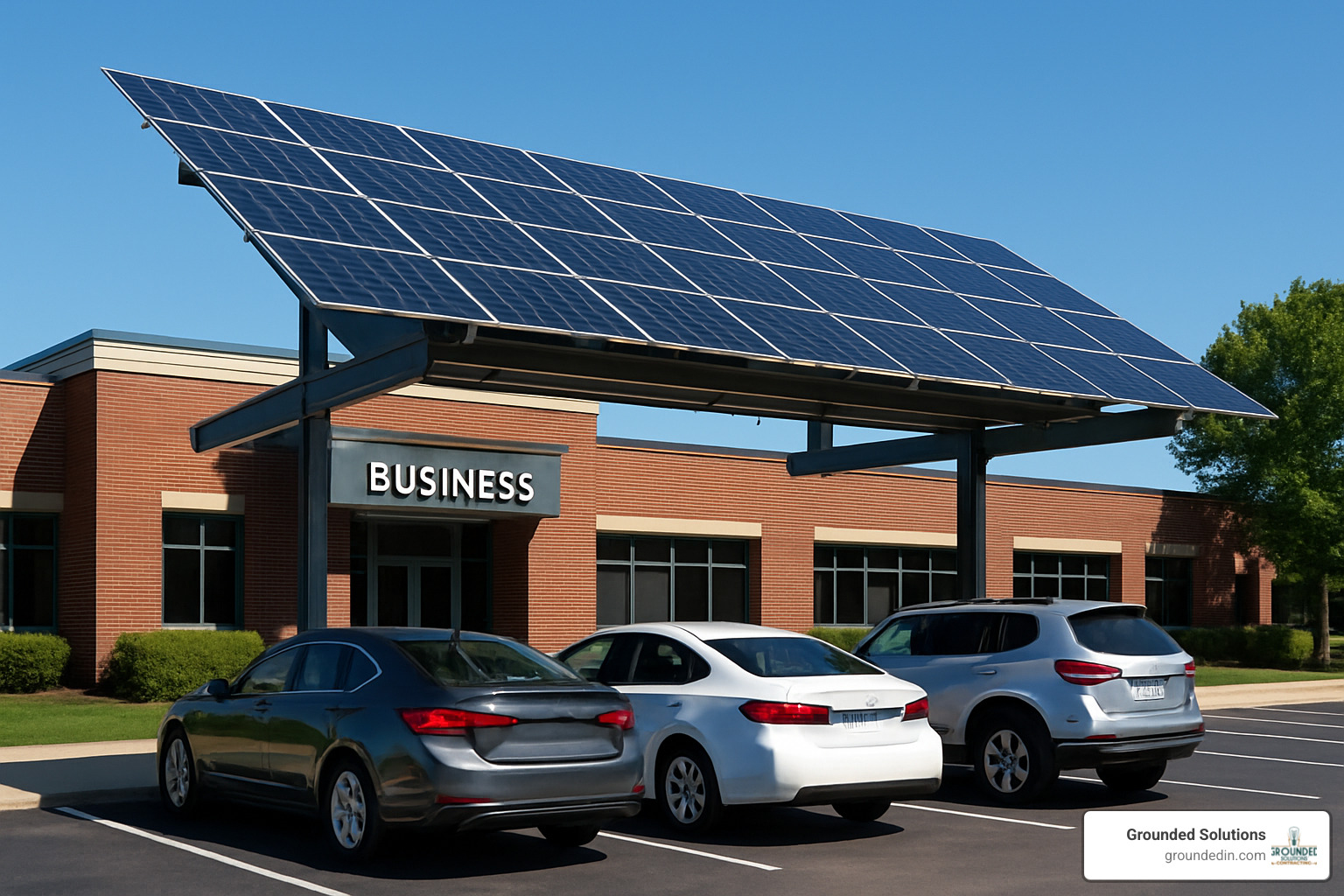
Rooftop Solar Systems
Rooftop installations remain the most popular choice for many of our commercial clients, and for good reason. These systems make brilliant use of otherwise unused roof space, turning that empty real estate into a power-generating asset. They’re naturally protected from vandalism due to their liftd position, and they don’t require any additional land purchase or allocation—a significant advantage for urban businesses throughout Indianapolis where space comes at a premium.
For the flat commercial roofs we commonly see across Central Indiana, we typically recommend ballasted mounting systems. These clever solutions don’t require roof penetrations, which helps preserve your roof warranty while ensuring the stability and longevity of your solar investment.
Ground-Mount Solar Arrays
When your roof isn’t ideal for solar—perhaps due to shading, orientation, or structural limitations—ground-mounted systems offer compelling advantages. We’ve installed these systems for numerous clients who appreciate their flexibility and performance.
Ground-mounted arrays allow for perfect orientation toward the sun, something that isn’t always possible with existing rooftops. Your maintenance team will appreciate the easier access for cleaning and service, without the safety concerns of roof work. Many of our clients in manufacturing and warehousing throughout Carmel, Fishers, and Greenwood have chosen ground mounts for their expandability—as your energy needs grow, additional panels can often be added more easily than with rooftop systems. The improved airflow around ground-mounted panels can also boost performance, especially during Indiana’s hot summer months.
Solar Carports
One of our favorite solar solutions to recommend is the solar carport—a true win-win that’s gaining traction among forward-thinking Indianapolis businesses. These innovative structures transform ordinary parking areas into power-generating assets while providing welcome shade and weather protection for employees and customers.
“Our solar carport has become a conversation starter with clients,” shared one of our customers, who owns a professional services firm in Carmel. “People park under it, notice the panels overhead, and immediately ask about our sustainability initiatives.”
Solar carports make your commitment to renewable energy highly visible, creating a powerful statement about your company’s values that customers and employees notice immediately. And since they use existing parking areas, no additional land is required.
Community Solar Options
Not every business owns their building or has a property suitable for solar installation. For these clients, we often discuss community solar as an alternative path to renewable energy. This approach allows you to participate in off-site solar projects, often with minimal initial investment and more flexible commitment terms than traditional installations. It’s an excellent option for businesses that rent their facilities but still want to support renewable energy and potentially reduce their electricity costs.
| System Type | Space Requirements | Relative Cost | Typical ROI Period | Best For |
|---|---|---|---|---|
| Rooftop | Existing roof space | $$ | 4-6 years | Businesses with large, unshaded flat roofs |
| Ground-Mount | Open land area | $$$ | 5-7 years | Properties with available land and optimal sun exposure |
| Carport | Existing parking areas | $$$$ | 6-8 years | Businesses wanting to showcase sustainability and provide covered parking |
| Community Solar | None (off-site) | $ | Variable | Renters or properties unsuitable for solar installation |
Choosing Panels & Layouts With Commercial Solar Panel Contractors
Working with experienced commercial solar panel contractors like our team at Grounded Solutions ensures you get the right equipment and configuration custom to your specific needs and circumstances.
Panel Orientation Considerations
The angle and direction of your panels—what solar pros call tilt and azimuth—significantly impact your system’s production. Here in Indianapolis, south-facing panels at a 30-35 degree tilt typically maximize annual energy production. However, that’s not always the best choice for every business.
On flat commercial roofs, we sometimes recommend east-west oriented systems instead of the traditional south-facing approach. These configurations can often accommodate more panels and produce more consistent power throughout the day, which can be advantageous for businesses with steady daytime electricity demand, even if the peak production is somewhat lower than south-facing arrays.
Mounting Systems
Your mounting system choice is just as important as panel selection. For flat commercial roofs with adequate load-bearing capacity, we often recommend ballasted systems that use weight to secure panels without roof penetrations. This approach minimizes the risk of leaks while providing excellent stability.
For pitched roofs or situations where maximum wind resistance is needed, attached systems that connect directly to the building structure provide superior stability. These require careful waterproofing to prevent leaks, something our experienced installation teams handle with meticulous attention to detail.
Panel Selection
Today’s commercial solar panels typically range from 375 to 500+ watts per panel. Selecting higher wattage panels means fewer panels needed for the same output, which can reduce installation labor and racking costs. However, these decisions involve balancing several factors including warranty terms, performance characteristics, and of course, budget considerations.
“We help businesses find the sweet spot between upfront cost and long-term performance,” explains our commercial solar design specialist. “Sometimes the most expensive panel isn’t necessarily the best value for your specific situation.”
By carefully analyzing your energy needs, physical space, and financial goals, we can recommend the perfect panel and layout combination to maximize your return on investment while meeting your sustainability objectives.
3. Partner With Experienced Commercial Solar Panel Contractors
Finding the right commercial solar panel contractors feels a bit like dating – you need chemistry, trust, and shared values for the relationship to work. Here in Indianapolis and throughout Central Indiana, your business deserves a solar partner who truly understands our local climate, building codes, and utility quirks.
When I meet with business owners considering solar, I always emphasize that the installer you choose can make or break your solar experience. A great contractor turns what could be a complex, stressful project into a smooth journey with predictable outcomes.
What Sets Top Commercial Solar Panel Contractors Apart
The difference between an average installation and an exceptional one often comes down to your contractor’s approach. At Grounded Solutions, we believe in the design-build EPC (Engineering, Procurement, and Construction) model because it creates a seamless experience for our clients. This means one team handles your entire project from initial concept through final commissioning – no finger-pointing between designers and installers when challenges arise.
Having in-house licensed electricians is another game-changer that many solar companies can’t offer. Solar is fundamentally an electrical system, so when your installer’s team includes licensed electrical professionals (rather than subcontractors who may not specialize in solar), your system benefits from expertise in both solar technology and electrical integration. This dual knowledge ensures your system works harmoniously with your existing building infrastructure.
“When we hired Grounded Solutions, what impressed me most was how they broke down our complex project into clear phases with definite milestones,” shared the operations manager of an Indianapolis healthcare facility we worked with last year. “Each step had defined deliverables and approval points, which gave us confidence throughout the process.”
The best commercial solar panel contractors also maintain transparent communication from start to finish. You should expect regular updates, clear timelines, and honest conversations about any challenges that arise. Solar installations involve multiple moving parts – from equipment delivery schedules to weather considerations – and keeping you informed helps manage expectations.
Vetting Commercial Solar Panel Contractors in Central Indiana
Before signing any contracts, I recommend taking these practical steps to evaluate potential partners:
Contact at least three references who operate businesses similar to yours. Ask specific questions about timeline adherence, problem-solving, and whether the system is performing as promised. A contractor confident in their work will gladly connect you with happy clients.
Check their BBB rating and online reviews, but look beyond star ratings to identify patterns in feedback. Are there consistent comments about communication, quality, or follow-through? These patterns tell you more than any single review.
Review their project portfolio with a critical eye. Have they completed installations for businesses in your industry? Do they have experience with systems similar in size and complexity to what you’re planning? An experienced contractor will have photos and case studies of relevant projects throughout Indianapolis and surrounding communities.
Ask how they calculate and present Levelized Cost of Energy (LCOE) figures. This calculation reveals the true cost of your solar electricity over the system’s lifetime and helps you compare proposals on an apples-to-apples basis. Beware of contractors who focus solely on upfront price without discussing long-term performance.
Verify their certifications, particularly NABCEP (North American Board of Certified Energy Practitioners) credentials, which represent the gold standard in solar installation expertise. Also confirm they carry adequate liability insurance and are properly bonded – protection that’s absolutely essential for commercial projects.
Discuss their safety record openly. Quality contractors maintain rigorous safety protocols and training programs, and they’ll be transparent about their history. At Grounded Solutions, we’re proud of our safety record and happy to share how we maintain it.
The lowest bid rarely delivers the best value. A quality commercial solar panel contractor might charge more upfront but save you thousands in avoided problems, system underperformance, and maintenance headaches over your system’s 25+ year lifespan.
More info about Commercial Services
4. Optimize Financing, Incentives & ROI
Let’s talk money—because that’s what commercial solar is ultimately about for most business owners. The good news? You’ve got options that can make solar not just environmentally smart, but financially brilliant too.
Financing Options for Commercial Solar
The way you pay for your system dramatically impacts your returns. Think of it like buying a car—cash, lease, and financing all get you driving, but with very different financial implications.
With a cash purchase, you’re in the driver’s seat from day one. You’ll capture all tax benefits directly (which are substantial—more on that in a moment), avoid any financing costs, and immediately add an asset to your balance sheet. One of our manufacturing clients in Fishers took this route and loves watching their energy savings drop straight to the bottom line each month.
Power Purchase Agreements (PPAs) offer a different approach that many Indianapolis businesses find attractive. With a PPA, you essentially agree to buy the power the system produces, but someone else owns the equipment. Zero upfront cost is the big draw here—you’re just buying electricity at rates typically below what you’d pay your utility. Plus, all maintenance headaches belong to the provider, not you.
Solar leases work similarly to how you might lease equipment or vehicles. You’ll make fixed monthly payments with minimal upfront investment. Some of our clients in commercial properties around Indianapolis prefer this option for its accounting advantages and potential lease-to-own provisions.
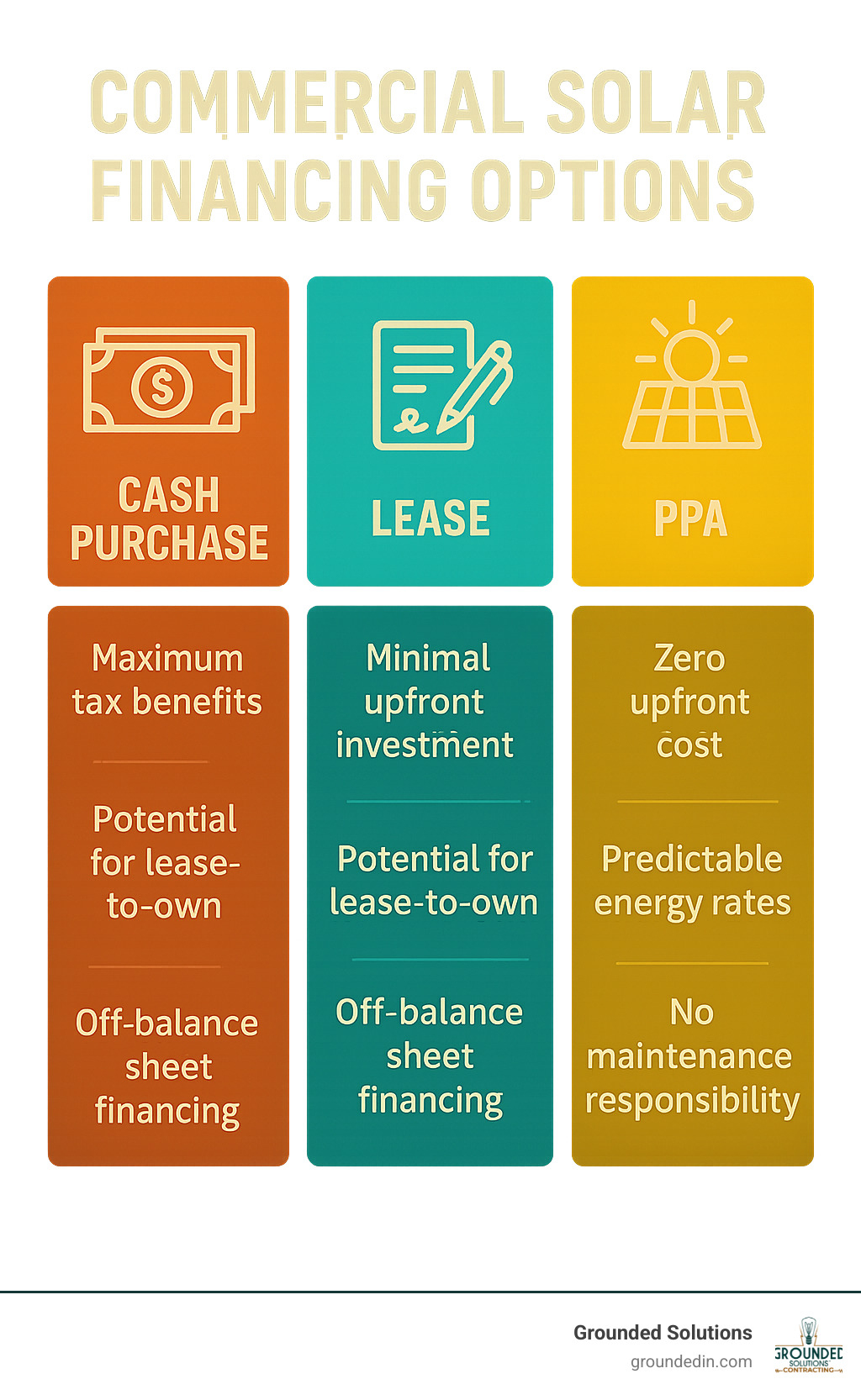
Key Incentives for Indianapolis Businesses
Here’s where things get exciting for Indiana business owners—the incentives available right now are historically generous.
The Federal Investment Tax Credit (ITC) is the heavyweight champion of solar incentives. At 30% of your total system cost, it’s like getting almost a third of your investment handed back to you at tax time. And unlike deductions that merely reduce taxable income, this credit reduces what you owe dollar-for-dollar. Can’t use it all this year? No problem—the credit carries forward to future tax years. Thanks to the Inflation Reduction Act, this benefit is locked in through 2032, giving businesses plenty of planning runway.
But wait, there’s more! The Inflation Reduction Act introduced bonus incentives beyond the base 30%. Using American-made components? That’s an extra 10% credit. Installing in an “energy community” (think former coal areas or places with higher unemployment)? Another 10% boost. One of our clients in eastern Indiana qualified for both bonuses, effectively getting half their system paid for through tax incentives alone.
Don’t overlook accelerated depreciation either. Commercial solar systems qualify for MACRS depreciation over just 5 years—much faster than typical capital improvements. This front-loads your tax benefits, improving cash flow when you need it most: in the early years after your investment.
“It’s like the tax code is practically begging businesses to go solar,” as our commercial project manager likes to say. And he’s not wrong—when properly structured, these incentives can slash the effective cost of your system by more than half.
strong internal rate of return
Modeling Payback and IRR
When our commercial solar panel contractors sit down with Indianapolis business owners, we go beyond simplistic calculations to show the true financial story.
The payback period—how long until your energy savings recoup your investment—typically falls between 3.5-5.5 years for commercial systems in central Indiana. That’s impressive considering these systems perform reliably for 25-30 years, meaning you’ll enjoy decades of essentially free electricity after that initial payback period.
Even more compelling is the Internal Rate of Return (IRR)—a metric sophisticated investors use to compare investment opportunities. Commercial solar projects in Indianapolis typically generate IRRs of 15-30% annually. Compare that to traditional investments, and solar starts looking less like an expense and more like one of your smartest business moves.
The story gets even better for businesses in energy communities. We recently worked with a manufacturing facility that qualified for the additional 10% energy community adder. Combined with their high daytime energy usage pattern and all other available incentives, they achieved an almost unheard-of 2.8-year payback period. Their CFO jokes that he wishes he could invest in more solar systems because nothing else in their portfolio performs that well.
At Grounded Solutions, we pride ourselves on providing transparent financial modeling that accounts for all these factors—and more. We’ll show you exactly how the numbers work for your specific business situation, with no smoke and mirrors. Because when the financials are this good, we don’t need to exaggerate anything.
5. Plan for Seamless Permitting & Utility Interconnection
The path from solar design to flipping the switch involves navigating what many of our clients consider the most challenging part of going solar: paperwork. As commercial solar panel contractors who’ve guided countless Indianapolis businesses through this process, we’ve developed a knack for making this bureaucratic maze feel much less daunting.
The Permitting Process
When we sit down with commercial clients, I often explain that permitting is like preparing for a thorough inspection before a big race—everything needs to be documented, verified, and approved before you can hit the track.
For Indianapolis businesses, this process typically involves several key components:
Site Drawings and Engineering Plans
Your solar project needs comprehensive documentation that leaves no question unanswered. We prepare detailed electrical and mechanical plans that show exactly how your system will be installed and connected. These aren’t just rough sketches—they’re professional engineering documents that specify every component and connection.
We also conduct a thorough structural analysis to ensure your building can support the additional weight, especially important for rooftop installations. Our team works with certified structural engineers who evaluate factors like roof age, construction type, and load capacity.
“One manufacturing client was concerned their 1980s metal building couldn’t support solar,” recalls our lead engineer. “After our analysis, we finded their roof was actually overbuilt to snow load standards that easily accommodated the panel weight—giving them the confidence to move forward.”
Required Approvals
Commercial solar in Central Indiana requires multiple approvals, each with its own timeline and requirements. Building permits confirm your system meets structural and safety codes, while separate electrical permits focus specifically on wiring, interconnection, and power systems.
Depending on your location, you might also need zoning approval to verify your solar installation complies with local land use regulations. Some areas have specific solar ordinances that dictate setbacks, heights, or screening requirements.
Structural Considerations
Every commercial system we install includes a Professional Engineer (PE) stamp certifying its structural integrity. This isn’t just a formality—it’s essential protection for your business and property.
Our engineering team calculates wind and snow loads specific to your location in Central Indiana. Indianapolis experiences significant seasonal weather variations, and your system needs to withstand everything from summer storms to winter snow accumulation.
“We handle all permitting paperwork and coordination with local authorities,” our permitting specialist often assures clients. “Our relationships with building departments throughout Central Indiana help expedite approvals and minimize delays.”
Utility Interconnection
Connecting your new solar array to the grid is a critical step that requires careful coordination with your local utility provider.
Net Metering Agreements
The formal process begins with your net metering application—essentially asking permission to send excess power back to the grid. For larger commercial installations, utilities sometimes require a system impact study to ensure your solar array won’t negatively affect grid stability or power quality.
Once approved, the utility will install a bi-directional meter that tracks both the energy you draw from the grid and the excess solar power you send back. This special meter is the foundation of net metering, allowing you to receive credit for your solar production.
Interconnection Standards
Each utility has specific technical requirements your system must meet. Your inverters and other equipment must be certified to utility standards, with proper safety features like automatic shutdown during power outages to protect utility workers.
Utilities also require accessible disconnect switches so their personnel can safely isolate your system during emergencies or maintenance. We ensure these are properly installed and clearly labeled according to utility specifications.
More info about Commercial Electric Upgrades
Regulatory Checklist for Indy Businesses
Indianapolis and its surrounding communities each have their own specific solar requirements that we’ve become intimately familiar with over years of installations.
Municipal Codes
Indianapolis has developed comprehensive guidelines for commercial solar installations, covering everything from setbacks to screening requirements. What works in Indianapolis proper, however, might not satisfy requirements in Carmel, Fishers, or Greenwood—each jurisdiction has its own approach to solar regulation.
For businesses in historic districts, there’s typically an additional layer of review to ensure solar installations don’t detract from historic character. We’ve successfully worked with historic preservation committees to design systems that meet both energy goals and aesthetic requirements.
Fire Safety Requirements
Fire safety is paramount in commercial solar design. Most jurisdictions require specific roof pathways and clearance areas so firefighters can safely access your roof during an emergency. These setbacks typically include 3-foot pathways along roof ridges and 18-inch clearances around the perimeter.
All our systems include code-compliant rapid shutdown capabilities, allowing emergency responders to quickly de-energize the system when necessary. This safety feature is non-negotiable for commercial installations.
Interconnection Timelines
Based on our experience with utilities throughout Central Indiana, businesses should plan for these typical timelines:
The initial application review usually takes 2-4 weeks, during which the utility evaluates your system design and specifications. The complete approval process generally spans 4-8 weeks for standard commercial installations, though larger systems may take longer.
After installation, expect another 1-2 weeks for final inspection and permission to operate (PTO) from your utility. This final step can sometimes test your patience, but we stay on top of the process with regular follow-ups to minimize delays.
Our team at Grounded Solutions has successfully steerd these requirements for dozens of commercial clients throughout Central Indiana. We’ve built relationships with permitting officials and utility representatives that help us anticipate potential roadblocks before they become problems.
As one client recently told us after receiving their permission to operate: “I can’t imagine trying to handle all that paperwork ourselves. Having Grounded Solutions manage the process made all the difference.”
6. Protect Your Investment With Monitoring & Maintenance
A commercial solar system isn’t a “set it and forget it” investment. Like any valuable business asset, it requires attention and care to deliver decades of reliable returns. At Grounded Solutions, we’ve seen how proper monitoring and maintenance make the difference between good and exceptional performance over time.
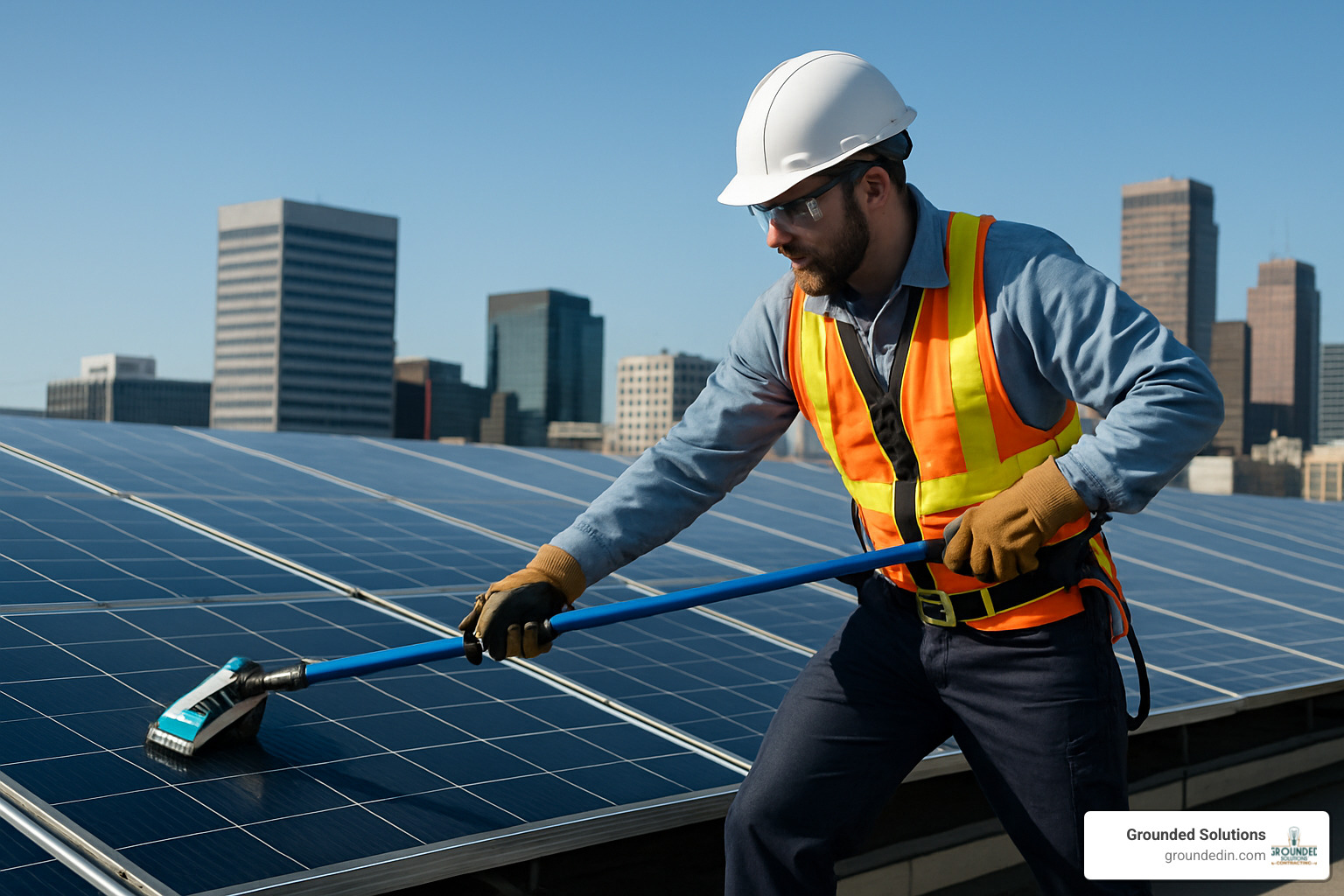
Real-Time Performance Monitoring
Today’s commercial solar installations come equipped with sophisticated monitoring systems that keep you connected to your investment 24/7. These smart systems provide intuitive dashboards accessible from any device, letting you track production in real-time and review historical performance data with just a few clicks.
The real value of monitoring comes from early problem detection. One of our Indianapolis office clients finded this when their system alerted us to a minor inverter issue that might have gone unnoticed for months. Our quick response prevented what could have been thousands in lost production.
Modern monitoring platforms don’t just track energy—they translate production data into financial metrics, helping you verify your return on investment against projections. This visibility gives you confidence that your system is delivering as promised.
Understanding Warranty Coverage
Commercial solar systems typically include several layers of protection that work together to safeguard your investment:
Panel performance warranties stretch 25-30 years, guaranteeing minimum power production levels throughout the system’s life. This is your assurance that panels will continue delivering electricity even decades after installation, with most manufacturers guaranteeing at least 80% of original output after 25 years.
Product warranties covering manufacturing defects typically run 10-12 years for the panels themselves, while inverter warranties generally extend 10-15 years for commercial-grade equipment. As your commercial solar panel contractors, we at Grounded Solutions also provide comprehensive workmanship warranties that protect against installation-related issues.
Understanding these warranty terms—and keeping proper documentation—is essential for protecting your investment throughout its operational life.
Maintenance Requirements
While solar systems have no moving parts, environmental factors can impact performance over time. A well-maintained system will experience output degradation of just 0.5% or less annually, compared to poorly maintained systems that might lose 1-2% yearly.
Annual cleaning makes a surprising difference—we’ve seen production increases of up to 35% after removing accumulated dirt, pollen, and bird droppings from neglected panels. In Indianapolis, where we experience everything from pollen-heavy springs to fall leaf debris, regular cleaning maintains optimal light absorption.
Beyond cleaning, periodic electrical inspections check for loose connections, weather damage, and component wear. These preventative checks often catch small issues before they become expensive problems. Inverters—the hardest-working components in your system—benefit from manufacturer-recommended service to ensure maximum efficiency and longevity.
Long-Term Care Agreements
Many of our commercial clients opt for comprehensive Operations and Maintenance (O&M) contracts that provide peace of mind and predictable maintenance costs. Think of an O&M agreement as an insurance policy for your solar investment—regular care not only maintains optimal production but can extend your system’s useful life well beyond the warranty period.
These agreements typically include scheduled preventative maintenance visits, priority response when issues arise, and detailed performance reporting. The most comprehensive plans include production guarantees that provide financial assurance of system performance.
The monitoring component of these agreements provides continuous oversight of your system’s health, with automated alerts for production anomalies and system faults. When our monitoring platform detects an issue, our technicians can often diagnose problems remotely before dispatching a service team, minimizing downtime and maximizing your energy harvest.
For businesses without facility maintenance staff, these agreements offer particular value—ensuring your solar investment receives expert care without burdening your team with additional responsibilities. Even clients with maintenance personnel appreciate the specialized expertise our commercial solar panel contractors bring to solar-specific maintenance requirements.
With proper care and attention, your commercial solar system will continue delivering clean, affordable energy and strong financial returns for decades to come.
Frequently Asked Questions About Commercial Solar in Indianapolis
How long until a system pays for itself?
I get this question from almost every business owner I meet with in Indianapolis. The simple answer? Most commercial solar systems here pay for themselves in about 3.5 to 5.5 years. But there’s more to the story.
Your specific payback timeline depends on a few key factors. Larger systems often benefit from better economies of scale, bringing down your per-watt installation cost. The federal incentives are fantastic right now with the 30% tax credit, but your business’s tax situation affects how quickly you can capture those benefits.
Your utility rates play a huge role too—the higher your current electricity costs, the faster your solar savings add up. And here’s something many business owners don’t initially consider: your daily operations schedule matters. Companies that use most of their electricity during daylight hours (when your panels are producing) typically see faster returns than those with heavy evening energy usage.
The best part? After that initial payback period, your business essentially enjoys free electricity for 20+ additional years. One of our manufacturing clients in Fishers just passed their payback milestone and now jokes that checking their monitoring app to see the free electricity rolling in has become their favorite morning ritual.
What warranties come with a commercial array?
Commercial solar installations come with several layers of protection that give our clients tremendous peace of mind. Your investment is protected by multiple warranty components working together:
Your solar panels come with two separate warranties: a 25-30 year performance warranty (guaranteeing panels will still produce at least 80-85% of their rated output by the end’s end) and a 10-12 year product warranty covering any manufacturing defects.
The inverters—those critical components that convert DC power from your panels into usable AC electricity—typically carry 10-15 year warranties for commercial grade string inverters, with microinverters often extending to 20 years.
Don’t overlook the mounting system warranty, which usually provides 20+ years of coverage against structural failures. This is particularly important for roof-mounted systems where you need confidence in the hardware securing your array.
Finally, there’s the workmanship warranty from your commercial solar panel contractors. At Grounded Solutions, we stand firmly behind our installation quality with comprehensive coverage.
One important tip: work with established commercial solar panel contractors who have staying power in the Indianapolis market. These long-term warranties only provide real protection if your contractor is still around to honor them years down the road.
How do commercial and residential installs differ?
Having installed both types of systems throughout Central Indiana, I can tell you the differences are substantial. Commercial installations aren’t simply “bigger residential systems”—they’re fundamentally different projects.
Scale and complexity is the most obvious difference. Commercial systems typically range from 10-100 times larger than home installations. This means more complex electrical integration, often requiring three-phase power connections that residential projects don’t deal with. Commercial projects frequently need structural engineering assessments to ensure roofs can handle the additional weight, or custom mounting solutions for unique building types.
The equipment differs significantly too. Commercial installations generally use larger, higher-wattage panels (typically 400-500W compared to 300-400W for homes). While residential systems commonly use string inverters or microinverters, commercial projects might employ central inverters for greater efficiency at scale. And mounting systems for commercial buildings—especially those with flat roofs—often use ballasted systems that don’t penetrate the roof membrane, unlike the penetrating mounts typical in residential work.
Financial structures for commercial solar are more sophisticated. Businesses benefit from different tax treatments and can take advantage of accelerated depreciation options unavailable to homeowners. Commercial clients have access to financing mechanisms like Power Purchase Agreements (PPAs) and PACE financing. And while homeowners often focus on simple payback periods, our business clients typically evaluate projects based on Internal Rate of Return (IRR) and Net Present Value (NPV).
Even the permitting and approval processes diverge significantly. Commercial projects must meet commercial building standards, often require more extensive utility interconnection studies, and frequently face different zoning considerations than residential installations.
“Commercial projects require a different level of expertise,” as our commercial project manager often reminds our team. “The scale, electrical complexity, and financial structures all demand specialized knowledge that doesn’t necessarily translate from residential solar experience.”
That’s precisely why at Grounded Solutions, we’ve developed dedicated commercial and residential teams, each with the specific expertise needed to excel in their respective areas.
Conclusion: Bright Ideas for a Sustainable Future
The energy landscape for Indianapolis businesses is changing rapidly. With utility costs climbing and sustainability becoming a business imperative rather than just a nice-to-have, commercial solar offers a powerful two-for-one solution. It’s an investment that pays dividends both financially and environmentally.
Throughout this guide, we’ve walked through the essential steps that make commercial solar projects successful. As I’ve seen working with businesses across Central Indiana, those who approach solar methodically tend to enjoy the best results.
Start with that comprehensive energy assessment – it’s like getting a complete physical before beginning a fitness program. You need to understand your building’s “energy health” before prescribing the right solution. This foundation ensures your system matches your actual needs rather than being unnecessarily oversized or underpowered.
The system type you select matters tremendously. For some Indianapolis businesses, a rooftop array makes perfect sense, while others benefit more from ground-mounted systems or the dual-purpose value of solar carports. Each option has distinct advantages that should align with your specific property and business goals.
Perhaps nothing impacts your long-term satisfaction more than your choice of commercial solar panel contractors. The quality of your installation directly affects decades of performance. Look for that NABCEP certification, a solid safety record, and deep knowledge of local permitting requirements. At Grounded Solutions, we pride ourselves on bringing both solar expertise and comprehensive electrical knowledge to every commercial project.
The current financial landscape for commercial solar is remarkably favorable. With the federal Investment Tax Credit at 30%, bonus incentives from the Inflation Reduction Act, and accelerated depreciation benefits, businesses have unprecedented opportunities to maximize returns. Many of our clients are seeing payback periods between 3.5-5.5 years with annual returns of 15-30% – performance that’s difficult to match with other business investments.
Don’t underestimate the importance of smooth permitting and utility interconnection. This administrative phase can become a frustrating bottleneck without proper guidance. Having a partner who maintains relationships with local building departments and utilities makes all the difference in keeping your project on schedule.
Finally, protecting your investment through monitoring and maintenance ensures optimal performance year after year. Those real-time dashboards, regular cleaning schedules, and professional check-ups aren’t just nice add-ons – they’re essential for maximizing your system’s lifespan and energy production.
As a family-owned and operated electrical contractor serving Indianapolis and Central Indiana since 2010, Grounded Solutions brings something special to commercial solar installations. Our team of fully licensed, bonded, and insured electricians delivers not just technical expertise, but the personalized service that comes from being rooted in the community we serve.
We take pride in helping Indianapolis businesses reduce their environmental footprint while simultaneously improving their bottom line. Whether you’re considering your first solar installation or looking to expand an existing system, our team is ready to guide you through every step with the care and attention your business deserves.
More info about full commercial services
Ready to see how commercial solar can transform your business’s energy future? Contact Grounded Solutions today for a solar readiness assessment custom to your specific needs. Let’s power your business forward together.
